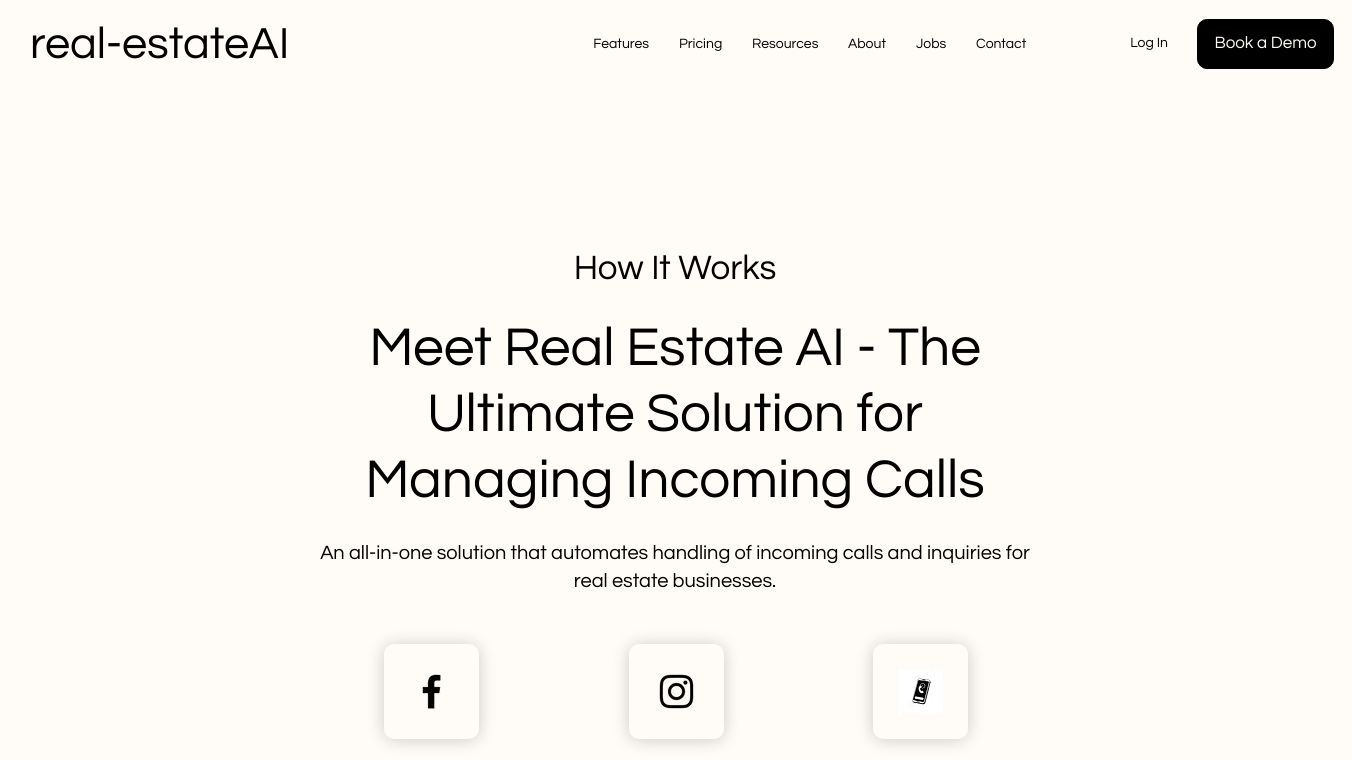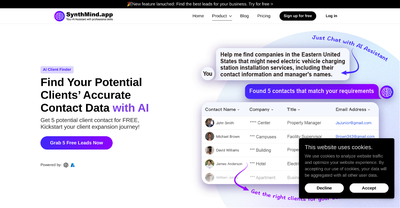Real Estate AI

Real Estate AI is a company that has evolved significantly since its inception in 2016. Originally known as Viral Zing Media, the company was rebranded to Real Estate AI under the leadership of CEO Jared Curry and Founder Matt Shields. The shift in focus to serve realtors specifically has positioned Real Estate AI as a leader in providing proprietary AI systems and award-winning coaching programs designed to help real estate professionals build successful businesses.
Real Estate AI offers a comprehensive 7 Figure Agent Coaching Program, which includes weekly coaching calls, group brainstorming sessions, and extensive career training courses. The program is designed to help agents improve their conversion rates, generate more listings, and work towards achieving 7 figure commissions. With a track record of working with over 300 realtors and managing millions of dollars in ad spend, Real Estate AI is well-positioned to support agents in their professional growth.
The company's unique approach combines invaluable technology tools with personalized coaching services. Real Estate AI's methodology is designed to help agents maximize their use of technology tools, improve their sales and marketing skills, and build lasting professional relationships with their clients. The coaching services have received numerous positive reviews, with clients praising the quality and value of the training provided.
Real Estate AI operates as a fully remote company, embracing modern business practices and providing a digital working environment. This approach has allowed the company to assemble a team of highly experienced digital marketing professionals and seasoned real estate agents. The team's expertise positions Real Estate AI well to provide genuinely helpful training and resources to realtors across the United States.
The inspiration for Real Estate AI came from the observation that many realtors were still operating with a 20th-century mindset, relying on referrals to generate leads and not fully embracing modern technology tools. Real Estate AI has developed AI tools specifically designed for realtors to help them generate more leads. However, generating leads is only the start. Successful agents must learn to convert those leads into listings and transactions. With Real Estate AI's 7 Figure Real Estate Agent Program, agents not only get access to valuable technology tools but also receive personalized coaching and extensive training courses to help them improve their sales and marketing skills and turn their business into a thriving career.
The numerous positive reviews are compelling for realtors who wonder if Real Estate AI's program is worth the investment. Real Estate AI guarantees ten listing appointments for their clients, and many attest to receiving even more. Reviewers detail generating dozens of leads with the help of Real Estate AI's ads and, with the help of the coaching program, have converted some of those leads into profitable listings. Agents praise the quality of Real Estate AI's leads and find that the training they receive transforms the way they approach their business.
With a strong business model and a track record of helping real estate professionals build profitable businesses, Real Estate AI is a valuable resource for anyone in the industry looking to increase leads and improve their sales conversion rates.
The real estate industry is undergoing a significant digital transformation, driven by increasing customer expectations and enhanced access to property data. Digital transformation has simplified how buyers and sellers connect, reshaping how agents and brokers operate in today’s market.
One remarkable example of AI’s impact is the world’s first AI-powered real estate agent, which has already closed over $100 million in sales, showcasing the real potential of AI for real estate agents in reshaping the industry.
According to Maximize Market Research, the AI in Real Estate market is expected to reach US$ 1,335.89 billion by 2029, with a compound annual growth rate (CAGR) of 35%, indicating the growing impact of AI in the industry.
Many real estate companies are turning to real estate BPO services to implement AI and manage AI-driven operations. These services help scale efforts while enhancing efficiency and improving the customer experience.
In this article, we will explore AI use cases in real estate, common challenges, emerging trends, and the evolving role of AI in real estate BPOs in this transformation.
How AI Is Adding Value to Real Estate
In the past, real estate agents primarily relied on cold calls, personal networks, and referrals to acquire new clients. Although effective, these approaches require considerable time and effort. Agents also struggle with quickly identifying serious leads, tracking client needs, and managing follow-ups efficiently.
AI for real estate agents is now changing that landscape. These tools help agents reduce time spent on repetitive work, better understand market trends, and offer clients more tailored support. Additionally, it enhances their overall workflow, making it smoother and more effective.
Siddharth Taparia, Global CMO of JLL, highlights how AI has revolutionized marketing and operational processes at JLL, a Fortune 200 company specializing in commercial real estate. Their proprietary AI model, JLL GPT, has enabled tasks that once took months to be completed in hours, enhancing efficiency and client service.
How AI can be used for Real Estate: Top Use Cases
From improving AI for property valuation to personalizing buyer experiences, AI in real estate is revolutionizing operations across the board. By leveraging data-driven automation, the sector can streamline processes and unlock new value at every stage of the property lifecycle.
Many firms are now adopting AI-powered real estate BPO outsourcing services to integrate these advanced technologies efficiently without overwhelming their internal resources.
- Property Valuation and Market Forecasting
Property valuation determines a property's current worth, while market forecasting predicts future trends based on economic, social, and market data. AI for property valuation is transforming the way appraisals are conducted by replacing static historical data with real-time predictive analytics, offering greater accuracy and speed.
Machine learning models ingest massive datasets, such as local sales trends, neighborhood amenities, crime rates, school proximity, and even social sentiment, to calculate accurate and dynamic property values.
For example, AI algorithms can detect micro-trends (e.g., rising demand in specific zip codes) that human analysts may overlook. As noted by Appinventiv, this data-rich approach enables real estate professionals and investors to make more informed decisions and anticipate market shifts well in advance.
- Lead Scoring and Personalized Marketing
Not all leads have the same potential. Traditionally, agents spend time contacting many prospects, often with low conversion rates. AI enhances this process by analyzing behavioral patterns, such as website visits, property views, email engagement, and social media activity, to rank leads based on their likelihood of conversion.
AI also enhances the property search experience by analyzing buyer preferences, such as budget, location, and desired features. It leverages both historical and current market data to deliver customized property recommendations that closely match individual needs.
This targeted search process saves buyers time and accelerates deal closures. Platforms like Redfin use AI-driven recommendation engines to guide buyers to the most relevant listings, making the property hunt simpler and more effective.
- AI-Powered Chatbots and Virtual Assistants
When you use AI chatbots in real estate, they provide 24/7 customer support by instantly answering inquiries, qualifying leads, and handling repetitive questions with ease.
This automation reduces response times, improves customer satisfaction, and frees up real estate agents or chat departments to focus on complex or high-value interactions. With AI managing routine communication, real estate teams can operate more efficiently and scale customer engagement during peak periods.
- Document Processing and Lease Abstraction
AI in document processing utilizes OCR and NLP to extract critical details from contracts, leases, and other legal documents. Managing contracts and lease agreements involves large volumes of paperwork that can be prone to errors and delays when done manually. AI technologies, such as NLP and OCR, automatically extract critical information, dates, clauses, signatures, and payment terms, from various types of documents. This speeds up reviews, improves accuracy, and ensures compliance with legal requirements. By outsourcing document management to companies like Invensis Technologies, real estate companies reduce administrative burdens and minimize risks associated with manual errors.
- Visual Recognition in Property Listings
Visual recognition AI analyzes property photos to verify quality and accuracy, checking for issues like poor lighting, incomplete views, or missing key features. It also helps categorize images and tag them with relevant property details, making REO listings easier to search and navigate for buyers. Additionally, AI can detect manipulated or misleading images to prevent the spread of misinformation. This technology ensures that property listings are presented professionally, which builds buyer trust and improves overall marketing effectiveness.
- AI-Powered Virtual Tours and Augmented Reality (AR) Staging
AI-driven virtual tours, combined with augmented reality, revolutionize how buyers view properties. These tools enable immersive, interactive walkthroughs from anywhere in the world, eliminating geographical barriers and saving time for both agents and buyers. Virtual staging powered by AI can transform empty spaces into beautifully furnished rooms tailored to different tastes, helping buyers envision the full potential of a property. This not only enhances buyer engagement but also accelerates decision-making, reducing time on market and increasing conversion rates.
- Smart Building Management Systems
AI-integrated building management systems optimize operational efficiency and sustainability. By continuously analyzing data from sensors and user behavior, AI can dynamically adjust lighting, heating, ventilation, and air conditioning (HVAC) to maximize energy savings without compromising comfort. Predictive maintenance, powered by AI, anticipates equipment failures before they occur, thereby minimizing downtime and costly repairs. For property managers and owners, this leads to reduced operational costs, longer asset lifespans, and a more eco-friendly footprint, an increasingly important factor for modern tenants and investors.
- AI-Driven Property Comparison Tools
Sophisticated AI algorithms analyze vast datasets to offer personalized property comparisons tailored to individual buyer or investor preferences. Beyond simple price and location, these tools evaluate amenities, neighborhood trends, historical price fluctuations, and even future development plans. This depth of insight empowers buyers to make smarter, data-backed decisions, reducing buyer’s remorse and increasing satisfaction. Investors also benefit from AI-powered risk assessment and ROI predictions, enabling more confident portfolio management and strategic acquisitions.
- Automated Valuation Models (AVMs) for Real-Time Property Pricing
AVMs use machine learning and statistical modeling to automate property valuation with high accuracy and speed. By analyzing structured and unstructured data, including recent sales, location-based trends, satellite imagery, and social sentiment, AVMs generate dynamic property estimates without manual input.
These models continually improve with continuous learning, enabling real estate firms to replace static valuations with real-time, predictive insights. This enables faster transactions, better risk assessment, and data-driven investment strategies.
- Collaborative Filtering for Personalized Property Recommendations
Collaborative filtering is a recommendation engine technique that analyzes user behavior and similarities to suggest relevant listings. It doesn’t just consider a buyer’s preferences, but also takes into account the behavior of similar users, such as viewed properties, saved searches, and engagement patterns, to deliver customized suggestions.
This technique creates hyper-personalized user journeys, increases engagement, and boosts conversion rates. Real estate platforms like Zillow use this method to streamline the search process and make property discovery more intuitive.
Challenges in Implementing AI in Real Estate
The adoption of AI in real estate has tremendous potential but also presents several critical challenges that companies must navigate to benefit from this technology fully. From data privacy to operational challenges, understanding these issues is crucial to achieving successful digital transformation.
- Data Privacy and Regulation Compliance
Real estate firms manage large volumes of sensitive information, including personal customer data, financial details, and transaction histories. Protecting this data while adhering to regulations like GDPR and CCPA is a major concern. Failure to secure data can lead to severe legal penalties and damage to brand reputation. Implementing robust cybersecurity measures and ongoing compliance monitoring is essential to balance AI-driven analytics with privacy requirements.
- Data Inconsistency and Integration Issues
Data inconsistency and integration issues are common in real estate operations. Legacy systems and siloed databases create fragmented and inconsistent datasets. For AI models to deliver accurate insights, they require clean, integrated data from multiple sources, including property listings, client interactions, and other relevant data. Overcoming these integration challenges demands investment in data migration tools and unified platforms that streamline data management.
- High Initial Costs and Skill Gaps
Corporate training experts, such as Edstellar, have found that companies worldwide face skills gaps related to artificial intelligence (AI) and machine learning (ML). Moreover, there is a notable shortage of professionals who combine deep AI expertise with an understanding of real estate market nuances. To overcome these challenges, companies must invest in ongoing training and recruitment to build capable teams for developing and managing AI-driven real estate solutions.
Given these hurdles, many real estate firms find it practical to outsource certain functions to specialized business process outsourcing (BPO) service providers. Services such as real estate data creation and customer support, handled by experienced providers, help fill talent gaps, reduce costs, and accelerate AI-driven real estate solutions. By leveraging real estate BPO services, companies can focus on their core business strategies while ensuring that critical AI-driven operations are efficiently managed.
- Resistance to Change Among Agents
Adopting AI tools often faces internal resistance, as real estate agents may worry about job security or adapting to new technologies. Without proper change management and education, this resistance can hinder progress. Emphasizing AI as a productivity enhancer, rather than a replacement, and offering hands-on training can help ease the transition and boost agent engagement.
- Bias and Ethical Concerns in AI Models
AI systems usually rely on historical data, which can contain inherent biases. If unchecked, these biases may lead to unfair property valuations or discriminatory marketing practices. Establishing transparent governance, conducting regular audits, and implementing ethical guidelines ensures that machine learning models make fair and unbiased decisions in real estate applications.
- Dependence on Quality Data Availability
AI accuracy is directly tied to the quality and completeness of data fed into the system. Real estate firms must maintain continuous data validation and updates to avoid outdated or inaccurate predictions. Investing in data governance frameworks ensures that AI outputs remain reliable and support sound decision-making.
Emerging Trends in AI and Real Estate
The landscape of AI in real estate is rapidly advancing, introducing new technologies that are transforming the way the industry operates. So, how can AI be used for real estate in the future? These emerging trends are setting the stage for smarter, faster, and more sustainable property markets.
Generative AI for Content Creation
Did you know that Gen AI could generate $110 billion to $180 billion or more in value for the real estate industry? Generative AI tools are becoming essential for automating property description writing and market report generation. By utilizing advanced natural language processing, real estate professionals can generate accurate, personalized content efficiently, thereby enhancing marketing strategies and saving time. This automation reduces human errors and ensures consistency across multiple listings.
Smart Contracts and Blockchain Integration
Integrating AI with blockchain technology is unlocking the potential of smart contracts in property-related transactions. These automated, self-executing contracts reduce reliance on intermediaries, streamline paperwork, and expedite the closing process. This fusion increases transactional transparency and security, fostering greater trust among buyers, sellers, and agents, key factors in the digital transformation of property deals.
Sustainable Smart Cities and Intelligent Homes
As urban areas move toward sustainability, AI plays a pivotal role in designing smart cities and eco-friendly homes. Leveraging data from IoT devices and sensors, AI optimizes energy efficiency, integrates smart transportation systems, and improves waste management. This trend highlights how AI in real estate supports environmentally responsible development and the creation of intelligent living spaces.
Real estate firms are increasingly partnering with BPO providers, such as Invensis, to outsource AI-powered services, while also leveraging advanced accounting software to streamline financial operations and enhance compliance.
Conclusion
The impact of AI in real estate is transforming how properties are valued, marketed, and managed, resulting in significant improvements in real estate automation, property management solutions, and an enhanced customer experience. From automating routine tasks to delivering personalized insights, AI is reshaping the entire real estate value chain.
As this digital transformation accelerates, business process outsourcing (BPO) partners like Invensis are playing a strategic role in helping real estate companies adopt, scale, and support AI-driven solutions for the real estate industry.
In a real estate market shaped by tighter regulations, rising costs, and unpredictable shifts, it’s more important than ever to work smarter. Whether you're a developer, property manager, REIT, or mortgage provider, streamlining operations and staying compliant shouldn't hinder your progress.
At Invensis, we combine real estate expertise with AI-led automation and deep analytics to help you stay ahead.
From legal and finance to day-to-day operations, we bring speed, accuracy, and insights that reduce risk and unlock growth, so you can focus on what matters: building value and delivering better experiences.
FAQs
- How does AI handle the complexities of fragmented real estate data?
AI systems utilize advanced data integration techniques to consolidate information from multiple sources, including MLS databases, public records, and customer interactions, into a unified platform. This harmonisation enables more accurate analytics and decision-making, overcoming the challenges commonly found in legacy systems within real estate firms.
- In what ways can AI reduce operational costs in real estate management?
By automating repetitive tasks such as document processing, lease abstraction, and maintenance scheduling, AI reduces the need for manual labor and minimizes errors. Predictive maintenance powered by AI also helps avoid costly repairs, optimising property management expenses.
- What ethical considerations arise with AI-driven decision-making in real estate?
AI models must be regularly audited to prevent biases, such as racial or socioeconomic discrimination, in property valuations or tenant screening. Transparent algorithms and compliance with fair housing laws are necessary to ensure equitable treatment of all clients.
- How do AI-powered virtual assistants enhance client engagement in real estate?
These assistants provide personalized communication by analyzing client preferences and history, proactively suggesting properties or answering queries at any time. This continuous engagement builds stronger relationships and improves conversion rates.
- What is the role of explainable AI in building trust with real estate stakeholders?
Explainable AI models provide clear reasoning behind valuations or recommendations, making complex algorithms understandable to agents, buyers, and investors. This transparency increases trust and facilitates informed decision-making.
- How does AI contribute to sustainability goals within real estate development?
AI analyses data from IoT sensors and urban infrastructure to optimise energy usage, waste management, and transportation planning in smart cities. This enables developers to design eco-friendly buildings that reduce environmental impact and operational costs.
When you think of artificial intelligence (AI), you probably don't think of real estate. After all, real estate has traditionally been a slow industry to innovate. Most transactions are still conducted through traditional brokers and independent landlords, even with real estate investment trusts (REITs) being the big players.
However, like much of the business world, the real estate industry is embracing the power of AI, which has implications for both commercial real estate and residential real estate.
Image source: The Motley Fool.
Any business that involves data is a good target for AI, and there's plenty of data in real estate. Appraisals and estimates have traditionally been based on neighborhood comparisons and human opinion, but AI-based algorithms are increasingly used to generate these estimates. For example, Zillow Group's (Z 0.35%)(ZG 0.4%) Zestimate is powered by AI.
Even generative AI now plays a role, creating 3D models of properties so potential buyers can use any connected device, such as a smartphone or tablet, to get a sense of how the properties look. The technology took off during the COVID-19 pandemic, when sellers were reluctant to have buyers enter their homes, and it's continued to grow.
Finally, AI also plays a role in smart-home devices, such as thermostats, lighting, cameras, and monitoring devices that inform landlords of any problems requiring attention, like a plumbing leak. In this look at AI in real estate, we'll explore ways that the new technology is changing the industry and provide some examples.
Understanding AI
Understanding AI
AI is generally understood as the ability of computers and machines to handle tasks that require human intelligence. Machine learning, one of the most common applications of AI, involves training machines with large amounts of data to recognize patterns, analyze data, and run forecasts and algorithms.
These applications are common in real estate. More broadly, AI technology includes computer vision in autonomous vehicles, robotics, neural networks, voice recognition, and natural language processing. Keep reading to see eight ways AI is used in real estate.
Eight uses
Eight uses of AI in real estate
- Predictive analytics
Perhaps the most common and practical use of AI in real estate is predictive analytics. When you see an estimate on the value of a property, it's generally based on predictive analytics from AI.
Zillow, the leading online real estate marketplace, uses AI for its Zestimates -- the proprietary valuation estimates it provides -- as well as for personalized recommendations, floor plans, and photos. Rival Redfin (NASDAQ:RDFN) uses AI for similar estimates and offers users an AI-powered tool to enhance and redesign listing photos.
Forecasting is important, especially when investing in commercial real estate. Investors, agencies, and economists use AI to predict where the real estate market is headed, hoping to get an edge on the competition and buy at the right price.
- 3D modeling/virtual tours
Visual representations have become increasingly important in the real estate industry. It's one of a number of industries taking advantage of digital twins: AI-based, computer-generated images that enable users to explore a space digitally.
Matterport, now owned by CoStar (CSGP 0.4%), is considered a leader in technology. It creates 3D virtual tours of properties, allowing potential buyers to use augmented reality and other features to explore a property before visiting in person. Matterport's proprietary AI, Cortex AI, is a neural network that utilizes computer vision, image processing, and deep learning to automate 3D-image construction.
Nvidia's (NVDA -0.64%) Omniverse technology, which enables the creation of digital twins, is often used for virtual tours, allowing prospective buyers to immerse themselves in the property. This technology can also be used for virtual staging, allowing realtors to virtually show a property fully furnished or with different layouts.
The technology helps increase the pool of potential buyers since anyone with a connected device can get a good look at the property. It also helps buyers, sellers, and agents save money by screening potential buyers to ensure they're interested.
Some start-ups are developing similar technologies that show renderings of properties that don't exist yet. Some of them focus on assisting architects and offer tools that can provide cost estimates based on different design options.
- Smart home devices
Real estate is a massive industry, and property tech might be an overlooked corner of it. However, property tech, or proptech, represents a fast-growing niche in the real estate industry.
Proptech focuses on devices that enable landlords and homeowners to monitor properties remotely. These include smart home devices, such as smart doorbells, locks, thermostats, and cameras, that help notify people of any problems that might occur inside the property.
AI enables devices to learn user preferences and adjust their settings accordingly. They can help save money on utilities, improve tenant satisfaction, and help the landlord stay up to date and avoid major repairs.
- AI in property management
Property management is another important subsector of the real estate industry. AI assists managers in screening tenants, collecting rent, and scheduling maintenance.
AI chatbots can play a role in tenant screening, much like their uses in customer service across other industries. They can answer questions about rental rates and availability and guide customers through the application process, alleviating some of the work required of human agents.
AI automation can assist with processing payments, managing workflows, performing market analytics, and managing collections. Additionally, AI assistants can generate reports to track leasing performance, helping improve occupancy and operational efficiency.
- Mortgages
Artificial intelligence is also gaining increasing adoption in financing, including mortgages. In underwriting, AI is used to analyze borrower information, including credit scores, income, and employment history, to evaluate the borrower's risk profile and find the best rate to charge.
AI tools help detect and prevent fraud and can automate loan servicing tasks, such as payment processing and customer communication. Some mortgage lenders, such as Rocket Companies (RKT 7.4%), use AI to deliver near-instant decisions on mortgage applications.
For instance, the company offers mortgage approvals in as little as eight minutes. In April 2024, it launched Rocket Logic, an AI-driven platform designed to simplify the mortgage application process for homebuyers and deliver approvals faster.
- Risk assessment and fraud detection
Risk assessment and fraud detection are other ways AI can benefit realtors and potential sellers. Machine learning algorithms can analyze large amounts of data to find suspicious patterns and potentially fraudulent behavior.
In this sense, cybersecurity plays a role in AI and real estate, and large landlords use platforms like CrowdStrike's (CRWD 1.1%) Falcon endpoint security program for threat detection. Commercial real estate services firm Cushman & Wakefield relies on the Crowdstrike platform for protection from fraud and other cybersecurity challenges.
- Automated property valuation
AI is also being used for automated property valuations. These automated valuation models utilize algorithms and data sets to determine a property's estimated value, using comparable sales, tax assessments, other listings, and records to determine a value.
Automated valuations offer some advantages over traditional methods, including speed, scalability, data-driven analysis, and real-time valuations. While they're not designed to be a full replacement for a comparative market analysis (CMA), they are a good starting point for valuation estimates and gathering information.
- Personalized property recommendations
Finally, AI is being used for personalized property recommendations. Instead of just analyzing properties, AI can review customer data, including purchasing history, browsing patterns, and preferences, such as size, budget, and amenities, to make recommendations for customers.
Much like with automated property valuations, this technology is designed to complement a human real estate agent, who can work with nuances and desires that would be beyond a typical AI function.
Related investing topics
How Artificial Intelligence Is Used in Customer Service
AI will almost certainly see rapid growth over the coming years as it continues to disrupt customer service.
How AI Is Used in Healthcare
AI is changing healthcare. Learn about the implications for the industry and investors.
How AI Is Changing the Retail Industry
Learn how artificial intelligence is impacting the retail industry today.
How Artificial Intelligence Is Transforming Business
AI technologies have a wide range of applications in business, and many publicly traded companies now use AI tools.
World-changing?
Will AI change the world of real estate?
Real estate is a massive, fragmented industry that is typically slow to change. However, the examples above show that AI is already affecting areas such as predictive analytics, property estimates, smart home devices, mortgages, and others. As AI improves, it's likely to become an even bigger part of the real estate industry.
If you're an investor searching for exposure to AI, consider AI stocks or AI exchange-traded funds (ETFs) or learn more about real estate investing to discover more opportunities to use AI in real estate. Keep your eye out -- more real estate companies are set to embrace AI in the future.
FAQ
Artificial intelligence in real estate: FAQ
What is AI in real estate?
angle-down angle-up
AI is used in a number of different ways in real estate, including for virtual tours, price estimates, and in underwriting mortgages, among others.
How is AI used in real estate?
angle-down angle-up
Artificial intelligence is being used in real estate in a variety of ways. For example, AI-generated 3D models enable prospective buyers to tour a property from the comfort of their homes. AI is also gaining popularity in underwriting to evaluate credit scores or employment history.
Is AI going to take over real estate?
angle-down angle-up
Like many market sectors, AI is unlikely to replace humans entirely within the real estate industry. Too many situations require a human touch for this to be a realistic goal. However, AI will likely continue to grow within real estate since it can help cut costs.
Is it worth investing in AI tools for real estate?
angle-down angle-up
Investing in AI tools can certainly pay off, though their usefulness likely depends on the size of the company. For an individual realtor, a direct investment might not be worth it when free tools are available. For a large commercial real estate company, employing AI tools could provide a competitive edge.
This content is either user submitted or generated using AI technology (including, but not limited to, Google Gemini API, Llama, Grok, and Mistral), based on automated research and analysis of public data sources from search engines like DuckDuckGo, Google Search, and SearXNG, and directly from the tool's own website and with minimal to no human editing/review. THEJO AI is not affiliated with or endorsed by the AI tools or services mentioned. This is provided for informational and reference purposes only, is not an endorsement or official advice, and may contain inaccuracies or biases. Please verify details with original sources.






Comments
Please log in to post a comment.